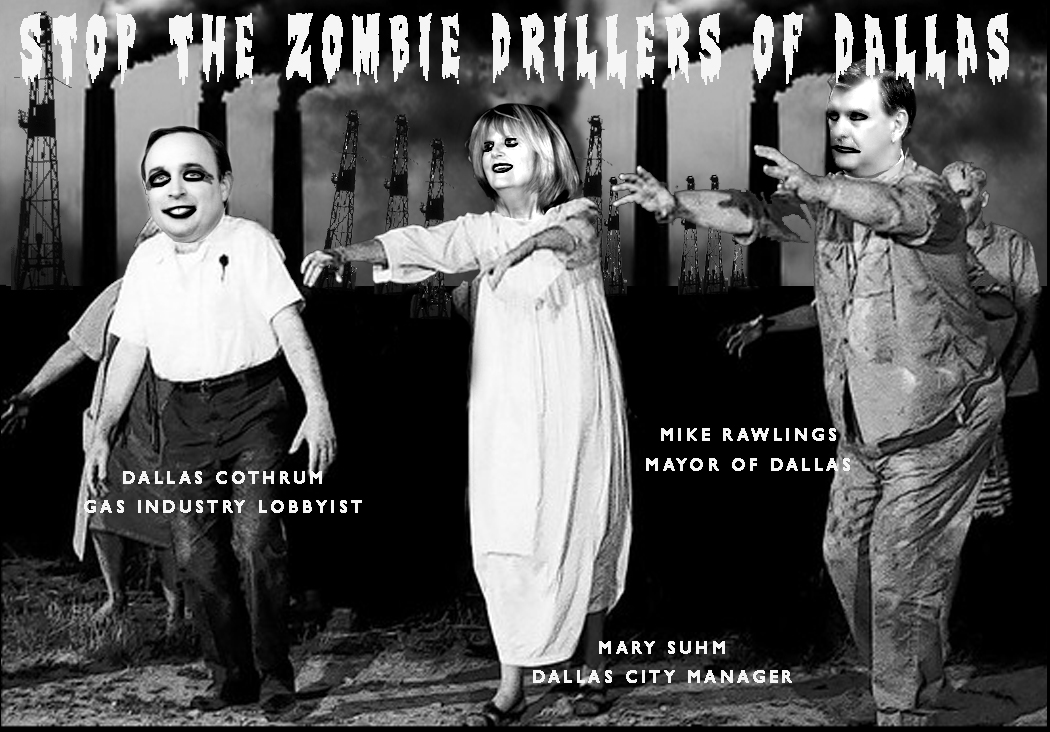Greenhouse Gases
Time to Push Back and Make Some History
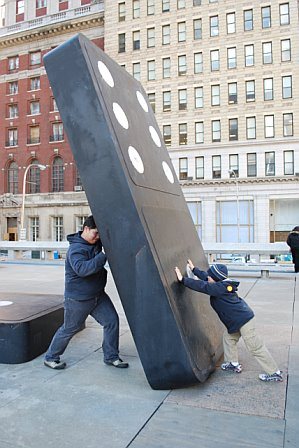 Dallas Plan Commission Public Hearings on Trinity East Gas Permits, including the "Rawlings Refinery"
Dallas Plan Commission Public Hearings on Trinity East Gas Permits, including the "Rawlings Refinery"
Thursday, 1:00 pm
6th Floor Dallas City Hall, City Council Chambers
When the Dallas Plan Commission held its January 10th vote to "reconsider" the denial of gas permits to Trinity East, it didn't allow any public testimony at all about the dangers posed by these proposed drilling and production sites.
Tomorrow it will. And we need you to come and add your body and your voice to this fight.
When the Mayor and City Manager first cooked up this scheme to ram through the last three gas permits in Dallas, they didn't expect to have any roadblocks. They scheduled a meeting five days before Christmas and thought they had it locked up.
They were wrong. You showed up anyway and the Plan Commission voted to deny the permits based on your impassioned pleas for public health and safety.
When City Hall didn't like the results of that vote, and pulled the "reconsideration" stunt in January, 100 of you showed up on a work day to shame the CPC publicly in a meeting that received a huge amount of media coverage.
Now they're holding the second public hearing on these gas permits. We need a larger show of strength to demonstrate we're gaining momentum
We need you to personally come and tell the Plan Commission why it's a bad idea to allow drilling in floodplains and parks and build a refinery next to the city's largest soccer complex where thousands of kids will be playing every weekend.
We know it's getting tiresome, but when you show up at these meetings and hearings, you're helping us win this fight.
Slowly, but surely, your concerns and questions about these Trinity East permits are weighing them down and making it harder for them to get rammed through.
For example, because of your work, we're about to see a bi-partisan call for the Mayor to reject the refinery permit near the Elm Fork Soccer complex. That news will be announced at tomorrow's press conference starting at 1:00 pm.
There's also more in the works challenging the process the City is using to keep these "zombie" permits alive.
The tide is turning. But you have to keep showing up.
Nothing can take the place of a room full of angry citizens. Tomorrow, don't just watch history on TV or read about it the next day. Make history. Thanks.
Zombie Gas Permits on the March Again
Public (re)-Hearing on the Last Three Dallas Gas Sites.……including the newly-discovered "Rawlings Gas Refinery"
This Thursday
1:00 pm
Dallas City Hall
6th Floor
City Council Chambers
Press Conference followed by City Plan Commission Mtg
This is the "do-over" hearing demanded by the Mayor in order to win approval of these permits – after the first one in December resulted in denial.
Come and defend this victory or they'll steal it away from us.
Dallas Residents at Risk, the alliance of groups that we work with on this issue, will be holding a press conference at 1:00 pm – just like we did before the much-publicized January 10th reconsideration vote – and then heading into the CPC meeting at 1:30. Show up early because we'll be talking about a surprising new development in this fight and bringing you up to date with the latest information.
It's important to demonstrate that opposition to these permits is growing, so if you haven't made it down to City Hall before, Thursday is the day to come.
If you're a regular, then you know how much warm bodies in the audience mean to the moment.
They would have been no news coverage on the 10th without all of us standing up and publicly "shaming" the CPC over its "reconsideration vote" in person. You can't do that by e-mail or petition. We need you there. We need you clapping for the good guys. We need you hissing the bad guys. We need you. There is no substitute.
Looking for material for your testimony? Here are some things we know now about these sites that we didn't when the CPC turned them down in December…..
* Neither the Park Board nor City Council ever voted to allow surface drilling in parks. In fact, city staff assured the City Council in 2008 that would be NO surface drilling in parks. So where did Trinity East get the idea it could have two of its drill sites on city park land (The newly-named Luna Vista Golf Course and near-by gun range)? That's a really good question that nobody at Dallas City Hall has attempted to answer.
* One of the Trinity East sites now contains a large gas refinery and compressor station in addition to a pad site for 20 wells. This facility will become the 10th largest air polluter in Dallas the moment it comes on line, releasing 75-100 tons of air pollution every year only 600 feet away from the City's new Elm Fork Soccer Complex on Walnut Hill.
* Last September, the City of Dallas denied a new permit to a rock crushing facility near the Elm Fork Soccer Complex because its 17 tons of annual air pollution was deemed too threatening for children's health. However, five months later, the city is advocating allowing the operation of a gas refinery and compressor station that is estimated to release some 75-100 tons of air pollution a year. Why is 17 tons of air pollution a health threat but 100 tons is OK? Another great question nobody at Dallas City Hall has answered.
* Trinity East knew when it signed its leases with the City that drilling in parkland and the floodplains was prohibited. So why is the City of Dallas still saying its afraid of a lawsuit by Trinity for backing out of the deal if the permits are denied?
We can win if we keep showing up and asking questions.
Please show up this Thursday.
Another Win for Your Lake of Air
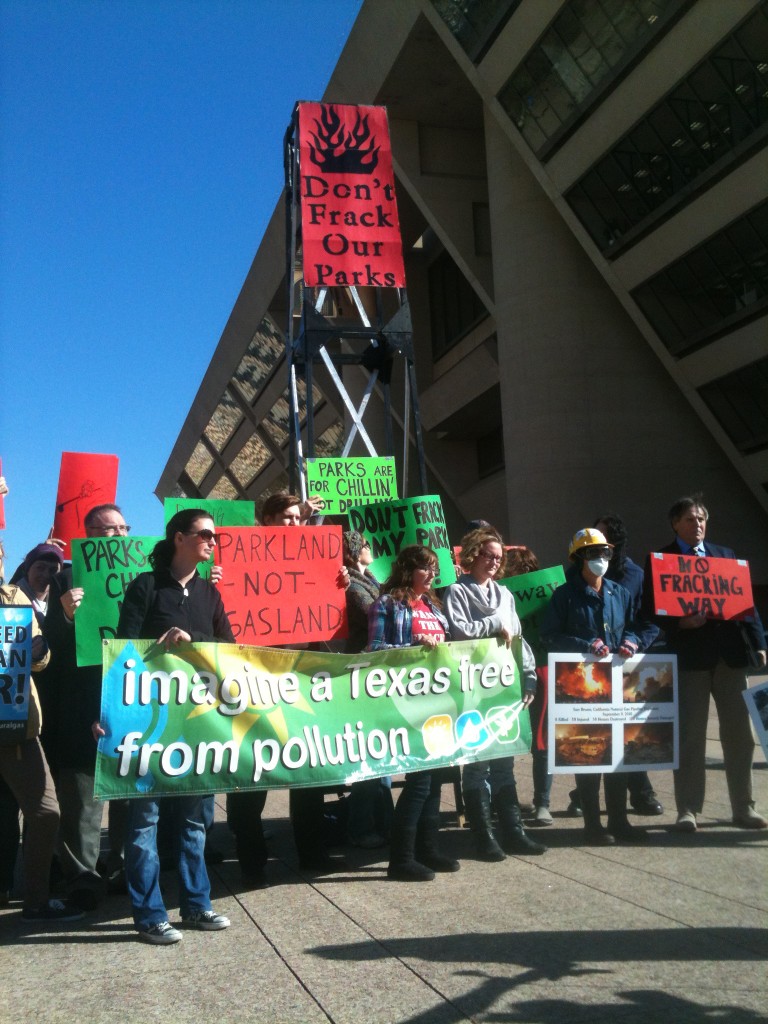 Late Thursday night Downwinders at Risk, as part of the Dallas Residents at Risk alliance, won a victory that citizens weren't supposed to win. Late Thursday night Downwinders at Risk, as part of the Dallas Residents at Risk alliance, won a victory that citizens weren't supposed to win.
Immediately after Thanksgiving, Dallas Mayor Mike Rawlings and City Manger Mary Suhm had plotted to speed the approval of the first gas drilling permit in Dallas. One left over from 2008 that would be exempt from the new drilling ordinance now in the works. One that included a compressor station and allowed for the drilling in city parks and flood plains. City Hall believed it had greased the tracks with threats of gas company lawsuits and given the City Plan Commission no choice but to approve the permit. Just to be sure, they scheduled the Plan Commission vote for December 20th, a time guaranteed to result in smaller crowds of opposition at City Hall. But something happened to make things go a little off-script. Responding to calls for help, enough Dallas residents showed up to articulately speak against the permit for more than an hour. They represented hundreds of neighborhood groups, the environmental community and public interest organizations like the League of Women Voters. If the raw numbers didn't match earlier attendance, the people that did show up represented real constituencies numbering in the thousands. When the vote was finally called at 7:30 pm Thursday evening, we won 7 to 5. The "grandfathered" gas drilling permit would not be approved by the Plan commission. To overturn this decision, the City Council must find 12 votes – a super majority – in favor of the permit at its mid-January meeting. This was not the result Dallas City Hall was counting on the Thursday night before Christmas. But thanks to supporters like you, it was the result that happened. Just as we mobilized opposition to Midlothian cement plant pollution, and helped organize Frisco residents to close down an obsolete and dangerous lead smelter, Downwinders is drawing a line in the Shale in Dallas and leading a push back against irresponsible urban drilling. And, against very long odds, we're winning….again. We do this to protect your lake of air. You ingest an average of 200 gallons of water every year, or about five bathtubs' worth. But you inhale approximately two million gallons of air every year – your own small lake of air.
In DFW, chances are your lake of air is going to have smog in it, along with some soot, some Sulfur Dioxide, Volatile Organic Compounds, as well as an assortment of other manufactured If your tap water was dirty brown and had lots of particles in it, you'd probably choose to drink bottled water. But when the air is dirty brown and has lots of particles in it, your lungs don't have a choice about the air they can use. Downwinders at Risk is here for one reason and one reason only: to defend your lake of air. Whether your air is threatened by smelters, gas rigs, cement plants or too-common smog, we're working to clean it up. For our efforts, Downwinders was proud to receive the first-ever GreenSource DFW award for Outstanding Grassroots Group in 2012. Looking ahead to 2013, your lake of air faces new threats, including worsening new permits by the Midlothian cement plants to burn large volumes of industrial garbage, and indiscriminate aerial spraying of pesticides by local governments. Downwinders at Risk will fight these threats with the combination of good science and citizen activism that's made us the foremost clean air group in DFW. But we need your help to do it. Our work depends on contributions from folks like you who appreciate what we do. Our annual budget is usually only around $30-50,000. We do all the work we do with an amount of money larger groups spend annually on office furniture or travel. We don't get money from a parent group in Washington or New York. Our board members are all from DFW. They're ordinary citizens like you, not rich patrons. Small donations make up a very large percentage of what we take in every year. We couldn't do what we do without you. In the time it took you to read this message, you've inhaled a couple of more gallons of air. Don't you think it should be clean air? You keep supporting us; we keep working for you – and surprising the opposition with victories that citizens in Texas just aren't supposed to be able to pull-off. That's our promise. Thanks for your consideration and Please click here to safely and securely donate online, or send checks to Downwinders at Risk, PO Box 763844, Dallas, TX 75376. Your donation is greatly appreciated and will be wisely spent. Thanks.
|
Red Alert for Dec 20th: Dallas Wants to Drill Like It’s 2009
 This is a heads-up to all Dallas residents: Dallas City Hall – the building, the people, everything – has climbed into a time machine and traveled all the way back to 2010.
This is a heads-up to all Dallas residents: Dallas City Hall – the building, the people, everything – has climbed into a time machine and traveled all the way back to 2010.
This has allowed the City council and staff to ignore citizen demands for a more protective gas drilling ordinance, the defeat of a council member who advocated drilling, the creation and conclusion of a task force for helping write a new ordinance, and a bunch of public hearings over the last two years – all so that Dallas City Hall can now just go ahead and do what the gas operators originally asked it to do at the beginning.
The first Special Use Permit request from a gas well operator to allow drilling in Dallas since 2010 will be on the agenda at the December 20th Dallas Plan Commission meeting at City Hall. It concerns a new request to drill by XTO (Exxon-Mobil) at the old Navel Air Station in southwest Dallas, near the Grand Prairie line, that was submitted on November 16th.
Time it's taken the City of Dallas to write a new drilling ordinance in Dallas: 24 months and counting
Time it took XTO to get its new drilling request heard despite not having that new ordinance yet: 20 days
You can read about the sudden jump into municipal action here behind the DMN paywall.
"XTO’s latest requests are apparently on a fast track, headed to the City Plan Commission….
A new, tougher Dallas drilling ordinance is in the works but has not been approved or even published for review, so the existing ordinance would govern the XTO applications, based on the city’s legal view that one set of rules should apply throughout the process."
Every Dallas City Council member appoints a representative to the City Plan Commission. Dallas residents should call their own City Council member (info here), or their Plan Commission appointee (download a list and contact info here) and tell them to reject this XTO request and any others that try to get processed before a new drilling ordinance is in place.
Here's the media release that Dallas Residents at Risk put out this morning about the sudden turn around:
Dallas Officials Consider Throwing Away Years of Work on New Gas Drilling Ordinance and Simply Let Fracking Begin
Have Mayor Rawlings and the Dallas City Council made a decision to move ahead with existing, pending and even new gas drilling applications without taking any action on the new “fracking” ordinance that has been in the works since 2010?
Two weeks ago, Exxon-owned gas company XTO filed a new gas drilling application—because their previous bid to drill at Hensley Field was denied by the Dallas City Plan Commission two years ago. Then the City Council appointed a special Gas Drilling Task Force, whose members met every week for eight months to consider proposals for a new ordinance. They finished their work in February of this year and issued their official recommendations, yet the City Council has not even begun drafting a new ordinance. The only rumored exception: City officials may consider simply changing the existing ordinance to allow fracking in floodplains, which would be necessary for gas company Trinity East to move ahead with its plans to drill in floodplain areas along the Trinity River. Neighborhood groups and environmental advocates say that’s unacceptable.
"This is the largest retreat of leadership that I can ever remember on such an important public health and environmental issue,” said Jim Schermbeck, Downwinders at Risk. “After three years of citizen complaints, a task force created, convened and concluded, expert and public testimony, and all Dallas residents get is a pair of shrugged shoulders from Mayor Rawlings and the Council? It's a bad joke."
There have been several major scientific studies surrounding the risks of fracking since Dallas officials began debating the new ordinance. Community leaders worry that new evidence pointing to health and safety risks for residents living near drilling sites will simply be ignored.
“So what if there's a 66% higher cancer risk within a half mile of a gas well; so what if already bad Dallas smog is made worse; so what if we still have no idea what chemicals will be used for fracking in Dallas,” said Claudia Meyer of the Mountain Creek Neighborhood Alliance. “It's as if the Mayor and Council are closing their eyes, plugging their ears, and desperately hoping to make all these new facts go away by just pretending they never happened.”
The new drilling applications leave Dallas officials exactly where they started, with the City Plan Commission being asked to shoulder the responsibility of deciding on whether to allow fracking to go forward. Advocates say the Commission should decline this offer and let the City Council do what it said it was going to do: Draft and pass a new gas drilling ordinance first.
“If we were only going to end up where we started, what was the point of a task force, or public hearings or anything that's happened since permitting stopped because the City wanted a new drilling ordinance,” said Zac Trahan with Texas Campaign for the Environment. “This is complete and utter dereliction of duty and public trust by the elected officials of this city on one of the most important public health and environmental questions to face Dallas in decades."
Cuts in Methane and PM Pollution Can Slow Climate Change
 In an opinion piece in The Daily Climate, Michael MacCraken, the chief scientist for the DC-based Climate Institute advocates an end-run strategy to avoid the political logjam over large CO2 cuts as a way to fight global warming. He suggests concentrating on reducing Methane and Particulate Matter pollution as a way to "appreciably slow the rate of warming over the next several decades." He cites an earlier UN study that concluded:
In an opinion piece in The Daily Climate, Michael MacCraken, the chief scientist for the DC-based Climate Institute advocates an end-run strategy to avoid the political logjam over large CO2 cuts as a way to fight global warming. He suggests concentrating on reducing Methane and Particulate Matter pollution as a way to "appreciably slow the rate of warming over the next several decades." He cites an earlier UN study that concluded:
"…a moderately aggressive international emissions control program focused on the short-lived compounds could roughly halve the projected warming between the present and 2050. While slowing the warming through this approach might seem to also offer additional time for cutting CO2 emissions, this is not the case. Instead, these actions are more appropriately viewed as partially making up for earlier policy delays.
For the United States to do its share, aggressive limits on CO2 emissions must be complemented by aggressive limits of emissions of short-lived species. In particular, the Environmental Protection Agency will need to be more aggressive in cutting short-lived emissions, particularly of methane from the oil and gas industry, and making its voluntary methane and black carbon programs mandatory.
With climate change so far along, the question now is no longer whether impacts can be avoided, but rather how bad they will become. What we do with respect to both mitigation and adaptation will control that outcome. The longer we wait, the worse the impacts and sharper the required energy transition."
While methane gradually breaks down in the atmosphere, forming carbon dioxide, it has 100 times the warming potential of carbon dioxide for the first 20 years it’s exposed to the environment. A study by Cornell University Environmental Biology Professor Robert Howarth found between four and eight percent of the methane produced by a fracking well is leaked into the atmosphere during the well’s lifetime. For all the immediate environmental benefits of natural gas, the methods used for its extraction could create a larger greenhouse footprint than oil or coal over time.
EPA is considering a new national PM pollution standard because of its public health impacts and should use the opportunity to win deeper cuts that offer so many "co-benefits." Every reduction in soot is now doubly important. Cars, cement kilns, coal plants, and just about any industrial boiler or furnace spews out PM. They all need to be targeted as part of a larger effort to bring this kind of pollution under better control.
This impact on global warming is also one more reason why Dallas residents should be demanding that the city incorporate some kind of "off-sets" policy regarding new oil and gas air pollution as part of a new City drilling ordinance. Not only can it hep reduce smog and some of the toxins released by the drilling and processing of natural gas; it can also provide some needed help for climate change at a time when the city is just squeaking by its own greenhouse gas reduction goals.
Australian Study: Fracking Releases 3X Normal Greenhouse Gases
S cientists from Southern Cross University in Australia found levels of greenhouse gases in that country's largest fracking play that were three times normal background levels, and higher than those recorded anywhere else on the planet.
cientists from Southern Cross University in Australia found levels of greenhouse gases in that country's largest fracking play that were three times normal background levels, and higher than those recorded anywhere else on the planet.
“The concentrations here are higher than any measured in gas fields anywhere else that I can think of, including in Russia,” Damien Maher, a biochemist who helped conduct the tests, told the Sydney Morning Herald."
Air contaminants being monitored included methane ad carbon dioxide.
"Some scientists surmise that the excess levels are due to seepage of the gas through displaced soil and aquifers that carry “fugitive” emissions released by fracking a mile or more below ground. Carbon cycle expert Peter Rayner of the University of Melbourne told the Australian Broadcasting Corp. that the elevated gas levels were probably due to “emissions that escape from the intended process of production.”
Not surprisingly, there are health complaints form residents living in and near the wells in the play.
"Helen Redmond, a physician with the New South Wales chapter of Doctors for the Environment, cited rising complaints of rashes, nausea, headaches and nose bleeds among people living close to the Tara gas fields.”Hydrocarbon exposure cannot be ruled out as a cause without much more comprehensive investigation,” she told the Sydney newspaper…."
Back here in DFW, Dallas is still stalling on writing a new gas drilling ordinance that citizens want to prompt the nation's first local policy of off-setting greenhouse gas pollution. And many observers believe DFW just failed its second clean air plan in five years because of the impact of rising gas industry pollution.
What Kevin Said
 Kevin Drum talks about the politics of Climate Change, and why it never came up in last night's presidential debate.
Kevin Drum talks about the politics of Climate Change, and why it never came up in last night's presidential debate.
GAO: Fracking is Overwhelming EPA, Has Many Unknown Risks
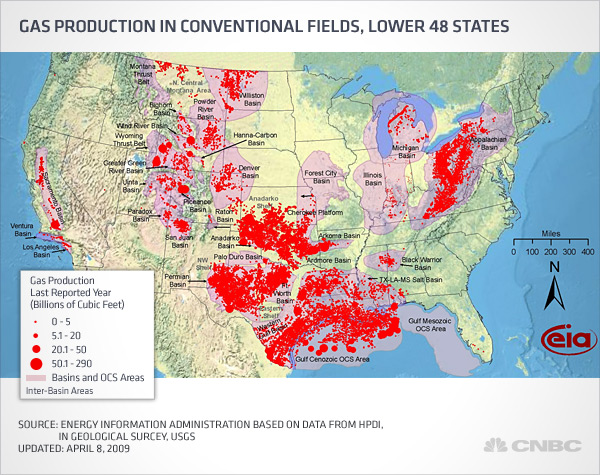 GAO stands for Government Accountability Office. We bet you didn't think there was such a thing.
GAO stands for Government Accountability Office. We bet you didn't think there was such a thing.
The GAO is in business to issue reports on how government works and doesn't work. It's the audit and investigative arm of the Congress. Today comes news that the Office has issued two new reports on fracking – one on how federal regulators are coping with the new responsibility of overseeing so much new drilling in so many new places all at once, and one on the possible risks posed by fracking to the public health and the environment.
GAO says fracking is overwhelming the resources of the federal agencies assigned to watchdog the process and industry:
"Federal and state agencies reported several challenges in regulating oil and gas development from unconventional reservoirs. EPA officials reported that conducting inspection and enforcement activities and having limited legal authorities are challenges. For example, conducting inspection and enforcement activities is challenging due to limited information, such as data on groundwater quality prior to drilling. EPA officials also said that the exclusion of exploration and production waste from hazardous waste regulations under RCRA significantly limits EPA’s role in regulating these wastes. In addition, BLM and state officials reported that hiring and retaining staff and educating the public are challenges. For example, officials from several states and BLM said that retaining employees is difficult because qualified staff are frequently offered more money for private sector positions within the oil and gas industry."
And the GAO says there are a lot of unknown risks to fracking based on the evidence so far:
Oil and gas development, whether conventional or shale oil and gas, pose inherent environmental and public health risks, but the extent of these risks associated with shale oil and gas development is unknown, in part, because the studies GAO reviewed do not generally take into account the potential long-term, cumulative effects. For example, according to a number of studies and publications GAO reviewed, shale oil and gas development poses risks to air quality, generally as the result of (1) engine exhaust from increased truck traffic, (2) emissions from diesel-powered pumps used to power equipment, (3) gas that is flared (burned) or vented (released directly into the atmosphere) for operational reasons, and (4) unintentional emissions of pollutants from faulty equipment or impoundments–temporary storage areas. Similarly, a number of studies and publications GAO reviewed indicate that shale oil and gas development poses risks to water quality from contamination of surface water and groundwater as a result of erosion from ground disturbances, spills and releases of chemicals and other fluids, or underground migration of gases and chemicals. For example, tanks storing toxic chemicals or hoses and pipes used to convey wastes to the tanks could leak, or impoundments containing wastes could overflow as a result of extensive rainfall. According to the New York Department of Environmental Conservation's 2011 Supplemental Generic Environmental Impact Statement, spilled, leaked, or released chemicals or wastes could flow to a surface water body or infiltrate the ground, reaching and contaminating subsurface soils and aquifers. In addition, shale oil and gas development poses a risk to land resources and wildlife habitat as a result of constructing, operating, and maintaining the infrastructure necessary to develop oil and gas; using toxic chemicals; and injecting fluids underground. However, the extent of these risks is unknown. Further, the extent and severity of environmental and public health risks identified in the studies and publications GAO reviewed may vary significantly across shale basins and also within basins because of location- and process-specific factors, including the location and rate of development; geological characteristics, such as permeability, thickness, and porosity of the formations; climatic conditions; business practices; and regulatory and enforcement activities."
So now we have the Director of the US Centers for Disease Control's Environmental Health agency saying that, "We do not have enough information to say with certainty whether shale gas drilling poses a threat to public health," along with the GAO saying the extent of the risks posed by fracking to our air, water, and land are largely unknown. How many more red flags do you need?
As His Replacement is Announced, Dr. Al Speaks Out in Austin
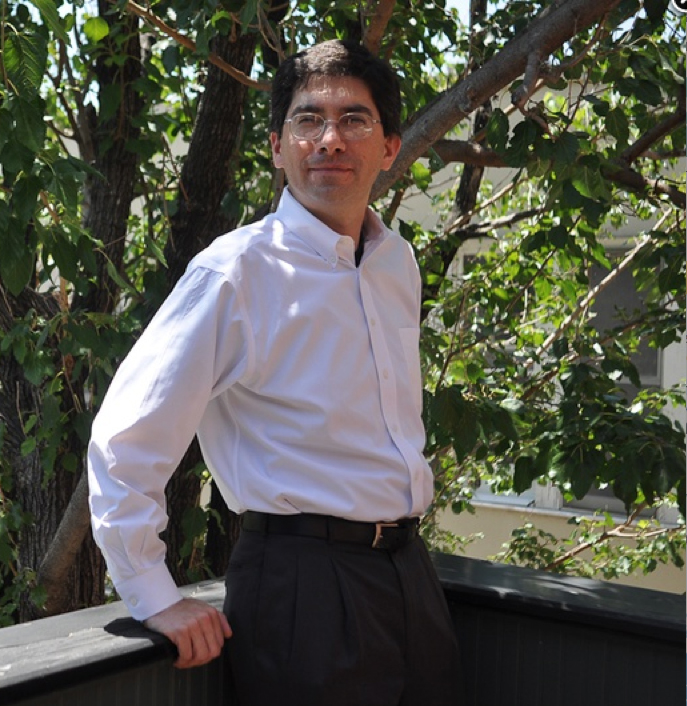 Maybe the EPA knew their former Region 6 Administrator Al Armendariz would be doing a one-on-one interview with the New-York Times-connected Texas Tribune as part of its annual festival on Saturday, or maybe it's just coincidence that the Agency named Armendariz's replacement very late Friday evening.
Maybe the EPA knew their former Region 6 Administrator Al Armendariz would be doing a one-on-one interview with the New-York Times-connected Texas Tribune as part of its annual festival on Saturday, or maybe it's just coincidence that the Agency named Armendariz's replacement very late Friday evening.
Whatever behind-the-scenes coordination did or did not take place, the appointment of New Mexico's Ron Curry as the new Region 6 chief gave Armendariz a slightly more removed historical perspective, and maybe willingness to talk, than he might have had otherwise.
Here's a live blogging of the interview that the Tribune's Evan Grant did with Armendariz from the Tribune festival itself in the middle of a forum on energy and the environment (11 am to 12 noon). Elizabeth Souder's recap for the Dallas Morning News is behind the paper's paywall, but here's a peak:
Former EPA regional admin Armendariz said anti-EPA court cases delay the inevitable
AUSTIN — Recent court cases striking down Environmental Protection Agency rules are just delaying the inevitable, said former regional EPA administrator Al Armendariz, who quit after a video surfaced showing him comparing his approach to Roman crucifixion.
Armendariz, who resigned as Region 6 administrator earlier this year and now works on an anti-coal campaign with the Sierra Club, said the agency will just re-write and re-apply the cross-state air pollution rule on coal plant emissions and its rejection of Texas’ flexible air permit rules. Some conservative Texas politicians regarded court decisions knocking down those rules as major victories.
Further, Armendariz said, the court decisions don’t show that the EPA was wrong. No, he said, the decisions show that the courts are wrong.
“They point out to me the importance of getting the President to appoint justices on the federal judiciary that will follow the law,” Armendariz said at a conference held by the Texas Tribune.
“I’m confident those actions, as written, were written completely in compliance with the law, and when those rules are revised that the agency is going to win any future litigation,” he said.
Armendariz defended his former employer and praised his successor at the Saturday appearance. He said the EPA and the White House have been working to implement the Clean Air Act and Clean Water Act, laws passed by Congress decades ago but never fully applied.
He criticized Texas environmental regulators who enable polluters, and called on energy regulators and lawmakers to create a plan to meet the state’s electricity needs with renewables.
Armendariz resigned in April after criticism over his comments in a video. In the video, he makes an analogy about his philosophy of enforcement. He said: “It was kind of like how the Romans used to conquer little villages in the Mediterranean. They’d go into a little Turkish town somewhere, they’d find the first five guys they saw and they’d crucify them. And then, you know, that town was really easy to manage for the next few years.
“And so you make examples out of people who are in this case not compliant with the law. Find people who are not compliant with the law, and you hit them as hard as you can and you make examples out of them, and there is a deterrent effect there.”
Arendariz on Saturday said he had apologized because his analogy offended people, which wasn’t his intent. But he didn’t back off the idea of deterring illegal polluting by punishing lawbreakers.
“I do stand behind the concept of my comments,” he said. “When you find someone who is violating the law, you do, within the boundaries of the law, vigorously prosecute.”
He said doing so ensures that illegal polluters don’t gain an unfair advantage over companies following the rules.
Texas Tribune chief executive Evan Smith said some people regarded the video as confirmation that Armendariz had it in for the energy industry.
Armendariz said such criticism was unfair, since in the video, he says his enforcement philosophy is for companies breaking the law.
Nor did he act alone by going after polluters. He said EPA administrator Lisa Jackson and her Washington staff had been “very involved with what we were doing in Texas.”
But he said leadership at the Texas Commission on Environmental Quality, the state regulatory arm of the EPA, is lax.
“There are some fantastic staff at TCEQ, and I think they’ve got poor leadership. I think the Governor’s appointees at that commission are preventing the staff from doing its job,” he said.
TCEQ chairman Bryan Shaw has criticized the EPA’s recent rules that would tighten regulations on coal plant pollution and greenhouse gas emissions.
And he praised his successor at the EPA, Ron Curry, the first non-Texan to lead the region that covers Texas, New Mexico, Oklahoma, Arkansas and Louisiana. The president announced the appointment last week.
“Ron is pragmatic, he’s very smart. He understands the need for conservation and the need for economic development,” Armendariz said.
Armendariz also said people who don’t believe in climate change are doomed to become irrelevant, just as doctors who don’t believe smoking causes cancer.
“I think the science of climate change is really irrefutable and those folks who are continuing to deny that climate change is a problem are really on the wrong side of history,” he said.
Now, Armendariz leads the Sierra Club’s anti-coal campaign, which aims to keep coal in the ground. He said so-called clean coal plants, which pollute less than traditional coal plants and capture greenhouse gases, are too expensive to justify coal mining.
“Clean coal I think is technically feasible, but I think it’s completely unnecessary,” he said.
He conceded the country will continue to use coal for the next decade. But he said coal isn’t necessary to keep the lights on.
The Electric Reliability Council of Texas has said the state is in danger of outages in the next few years because power plant developers haven’t build enough new generation to keep up with growing demand. The prospect of shutting down coal plants because of stiffer environmental regulations has left some regulators nervous about blackouts.
Armendariz said the reliability problem is due to a “complete lack of leadership and forethought.” He called on regulators and lawmakers to solve the problem with long-term planning and a vision centered on renewables, such as wind and solar.
Gas Industry Cites Decreasing CO2, Forgets About Increasing Methane
 Maybe you've seen the headlines over the last couple of days. US Carbon Dioxide (CO2) emissions reached an historical 20 year low in the first quarter of 2012. The Federal Energy Administration attributed this decline to three factors: a mild winter, less travel, and gas-powered utility plants replacing coal-fired ones. Whereas coal was producing about 50% of America's electricity in 2005, it's only contributing 34% now, with most of that slack now being taken up by gas-generated electricity.
Maybe you've seen the headlines over the last couple of days. US Carbon Dioxide (CO2) emissions reached an historical 20 year low in the first quarter of 2012. The Federal Energy Administration attributed this decline to three factors: a mild winter, less travel, and gas-powered utility plants replacing coal-fired ones. Whereas coal was producing about 50% of America's electricity in 2005, it's only contributing 34% now, with most of that slack now being taken up by gas-generated electricity.
Gas industry representatives were quick to take credit for the reduction and use it has proof of how climate-friendly natural gas is. But they forgot something important when they did that. They didn't weigh the increase in methane releases caused by gas mining against the decrease in CO2 pollution. Methane doesn't have the lifespan of CO2 in the atmosphere, but pound per pound in the short-term, it's 25 times more potent in its climate change impact. According to climate scientist Michael Mann of the Earth System Science Center at Penn State University, “We may be reducing our CO2 emissions, but it is possible that we’re actually increasing the greenhouse gas problem with methane emissions.”

